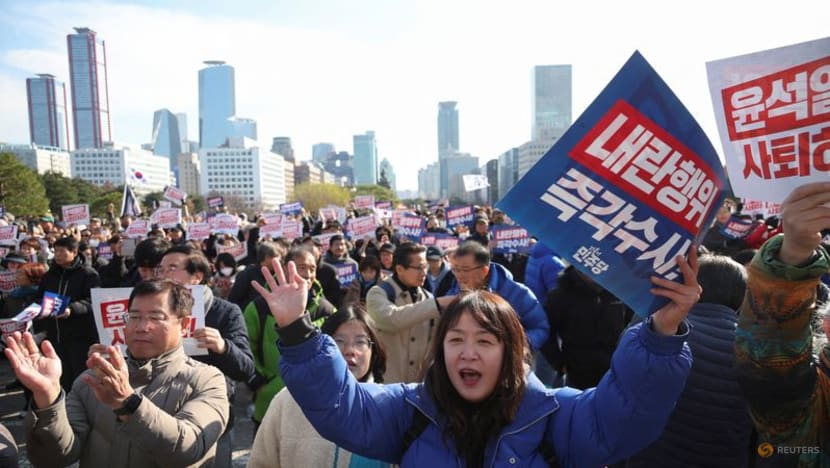Commentary: Capitalism is the unsung hero of South Korean democracy
The ascent of South Korea’s economy helps explain the resilience of the political system. President Yoon Suk Yeol was really battling history in his attempt to impose martial law, says Bloomberg Opinion’s Daniel Moss.

SINGAPORE: When the history of this tumultuous week in South Korean politics is written, legislators who demanded the president rescind his declaration of martial law will surely be lauded. It’s also worth standing back to examine the role that economics has played in the country’s transition to democracy, and why that least-worst system of government, to quote Winston Churchill, survived.
The contribution of capitalism – its constraints and opportunities – has been vital. The rhythms of global commerce have been present at key points in South Korea’s journey. It’s fair to say that without the thrills and spills of money, there wouldn’t have been a mature democracy to protect. That you may not have noticed is a testament to its success and durability.
Of all the potential year-end shocks that traders had gamed out, Tuesday (Dec 3) night's brief but alarming events didn't come close to making the cut. Markets were braced for social media posts on outlandish cabinet picks by Donald Trump, new tariff threats, and the prospect of a French government implosion, not an attempted coup by President Yoon Suk Yeol.
NO ECONOMIC BLOODBATH AFTER MARTIAL LAW CRISIS
The reaction was swift but contained: The currency tumbled in offshore trading, along with other assets tied to South Korea. By Wednesday morning, after lawmakers rebuked Yoon, the won had recouped losses and bonds were little changed. Equities fell in local trading, but by no means was it a bloodbath.
Regulators were ready to provide ample liquidity. Dramatic gestures like shutting the stock exchange were eschewed, as were panicky moves like further interest-rate cuts. Officials backstopped the system without fuss.
This is the way it's supposed to work: Instill confidence, not sap it. Textbook central banking.
This doesn't mean the economy will sail smoothly. Gross domestic product rebounded slightly in the third quarter from a modest contraction in the previous three months. The Bank of Korea had already signalled its worries by unexpectedly reducing borrowing costs last week, and making concerned noises about a resumption of trade wars.
But a cyclical downdraft is different from a shock that strikes at the heart of the administration. (When I previously wrote that the country was preparing for bleak days, the would-be putsch wasn’t what I foresaw.)
ECONOMICS AND POLITICAL UPHEAVAL IN ASIA
The good news is that economics and political upheaval have often been strange bedfellows in South Korea – and elsewhere in Asia.
As military-backed leaders in Seoul pushed rapid industrialisation in the years after the 1950 to 1953 war that left the peninsula divided, it was almost inevitable that prosperity would bring with it a rising middle class that became more aspirational and demanded a greater say in how it was governed. The scrutiny that came with integration in supply chains, inbound and outbound investment, and the price demanded for access to global markets forced South Korea to clean up its act.
Booms also bring busts and Seoul came within an inch of default in the late 1990s during the Asian financial crisis. As wrenching as the meltdown was, it was also part of a big shift in the country’s politics.
For the first time, a long-standing opposition politician, Kim Dae-jung, was elected president. Government figures tried to murder him during the dictatorship years, but American intervention kept Kim alive. His moment came and the transition to full democracy was complete.
FORCES UNLEASHED BY CAPITALISM AND AN OPEN ECONOMY
As lawmakers debated the future of the now disgraced Yoon on Wednesday, a former South Korean trade minister sat down with Bloomberg journalists in Singapore.
I asked him whether, from a historical vantage point, the ebbs and flows of capitalism were effectively the midwife to democracy in Korea. “Absolutely,” replied Yeo Han-koo, a senior fellow at the Peterson Institute for International Economics in Washington. “There's no turning back.”
Financial swings also led to a revolution and, ultimately, a freer system in Indonesia. It hasn’t been perfect; the years after the International Monetary Fund imposed harsh conditions on loans that pushed autocratic ruler Suharto out were marred by communal violence and efforts by far flung provinces to break away. Although Suharto’s son-in-law, Prabowo Subianto, now sits in the presidential office, he had to get there the hard way – via the ballot box.
In Malaysia, Mahathir Mohamad held on to power for a few years after the financial collapse, but the ructions it produced cemented Anwar Ibrahim as the leading alternative. Anwar became prime minister in 2022 and presides over a sprawling coalition that, against the odds, he has held together.
There are exceptions to these encouraging stories: China didn’t democratise as its economy flourished and markets took shape. If anything, it has gone in the opposite direction: President Xi Jinping has accrued more personal authority than any leader since Mao Zedong. Perhaps the moral is you have to be very big to stand against the forces that thriving capitalism and an open economy unleash. Taiwan did manage the transition after decades of enviable growth.
Governance can take detours, as Koreans have found out. But the necessities of operating within the global economic system also bring checks on the power of ambitious leaders. Let’s salute the people of South Korea, but also the not-so-invisible hand of commercial priorities.
















